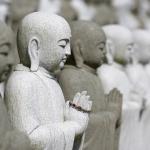The Spiritual Life
The Spiritual Life in Today's World
Spirituality simply consists in discovering and becoming one’s higher, nobler self, in accentuating the highest in motive, speech and the conduct of life. Indeed, the discovery and expression of one’s highest Self is both the immediate and the main and true purpose of all spiritual exercises. Especially is it the message of the unhappiness and pain which have so large a part in human experience. Pain itself can be one of the chief agencies which cause men to seek and follow the spiritual life, even whilst fulfilling worldly duties.
The message of pain is at least threefold: to awaken compassion for the pain of others to be compassionate is in itself to be spiritual; to teach us to live according to the law of love; and to serve as a spur to induce each one of us to rise to those levels of human nature and consciousness where pain is not, which means the level of the permanent realities and of the Spiritual Self of a man or women. Then each can can release into his or her life the power, the light and the life of that Self. Then spirituality becomes natural to us. In such ways pain can be turned to very good purposes.

How is the spiritual life to be lived by men and women amidst the pressures of mundane, earthly life and duties? There are at least two essentials: spiritual awakening and ordered effort.
Spiritual Awakening
Spiritual awakening in an individual is as natural as is the appearance of bud and flower in the plant. At a certain stage of evolution there naturally occurs an awakening of the will to attainment. One possible meaning of the parable of the ten virgins, five wise and five foolish, is that five were spiritually awakened and five were not (Matt, XXV: 1-13).
When certain phases of evolution are entered upon, the ego becomes strong enough to send spiritualizing influences “down” to the personality. These strengthen conscience, and arouse the aspiration to make the most of life and to live in the highest possible purity and service. Such experiences are sometimes accompanied by visions of divine perfection and mystical events of various kinds.
Three interior experiences are then passed through.
Firstly, mentally awakened one seeks the answers to the problems of life. They demand logic in religion and justice from God. Their interest in philosophy and religion deepens. They begin the great search for knowledge, which is often hastened by such painful experiences as worldly failure, bereavement, frustration, and even disaster.
Second, one experiences both an awakening of will and a divine discontent. The outer person becomes aware of the “inexpressible longing . . . of the inner nature for the infinite.” Dissatisfaction, self-shame, the sense of failure even amidst material success - all these act as spurs. They recognize that selfishness and materialism have ruled their life, and sees how harmful they are and how hurtful to others he or she has been. At this stage help becomes available. The aspirant meets a teacher, either interiorly, externally or both.
The third experience which accompanies the true awakening of the soul is a diminution of the sense of separateness and an increase of those of kinship and responsibility. There is a change of nature from getting to giving, and a change of accent from the personal to the impersonal, from the smaller self to the larger Self.

Ordered Effort
The second essential was ordered effort. Here two ideas are met, both somewhat new to Western thought. The first of these is that the spiritual life can be lived whilst out in the world, even amidst business and domestic activities; for in them opportunity and guidance can be found for the pursuit of the new interest — the search for truth, understanding, power, reason and beauty in life.
One qualification must, however, be made; this is that the means of livelihood must be neither ignoble nor hurtful to others, whether animals or human. The second idea is that the practice of the spiritual life is a science, an ordered, carefully organized effort being essential to success. This concerns the daily life of the aspirant, which must include regular meditation or prayer, study and character building, and self-giving in service without thought of return.







